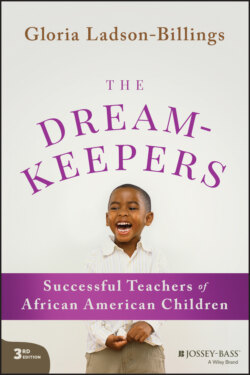The Dreamkeepers

Реклама. ООО «ЛитРес», ИНН: 7719571260.
Оглавление
Gloria Ladson-Billings. The Dreamkeepers
Table of Contents
Guide
List of Tables
List of Illustrations
Pages
THE DREAMKEEPERS. SUCCESSFUL TEACHERS OF AFRICAN AMERICAN CHILDREN
FOREWORD TO THE THIRD EDITION
Notes
PREFACE
Acknowledgments
THE AUTHOR
INTRODUCTION
Technology Take Over
Hip-Hop as a Hope—The Rise of Youth Culture
Notes
1 A Dream Deferred
The Current Climate
Separate Schools or Special Schooling?
A Study of Effective Teaching for African Americans
Notes
2 Does Culture Matter?
The Notion of Cultural Relevance
How Teachers See African American Students
A Group Profile of the Teachers Who Participated in the Study
Notes
3 Seeing Color, Seeing Culture
The Basics of Culturally Relevant Teaching
Teachers with Culturally Relevant Practices Have High Self-Esteem and a High Regard for Others
Teachers with Culturally Relevant Practices See Themselves as Part of the Community, See Teaching as Giving Back to the Community, and Encourage Their Students to Do the Same
Teachers with Culturally Relevant Practices See Teaching as an Art and Themselves as Artists
Teachers with Culturally Relevant Practices Believe that All Students Can Succeed
Teachers with Culturally Relevant Practices Help Students Make Connections Between Their Community, National, and Global Identities
Teachers with Culturally Relevant Practices See Teaching as “Digging Knowledge Out” of Students
Notes
4 We Are Family
We're All in This Together
The Teacher-Student Relationship in the Culturally Relevant Classroom Is Fluid and “Humanely Equitable”
Culturally Relevant Teaching Involves Cultivation of the Relationship Beyond the Boundaries of the Classroom
Teachers with Culturally Relevant Practices Are Careful to Demonstrate a Connectedness with Each of Their Students
Teachers with Culturally Relevant Practices Encourage a Community of Learners
Culturally Relevant Teaching Encourages Students to Learn Collaboratively and Expects Them to Teach Each Other and Take Responsibility for Each Other
Concluding Thoughts
Notes
5 The Tree of Knowledge
Culturally Relevant Conceptions of Knowledge
Culturally Relevant Teaching Views Knowledge as Something That Is Continuously Re-created, Recycled, and Shared
Culturally Relevant Teaching Views Knowledge Critically
Culturally Relevant Teaching Is Passionate About Knowledge
Culturally Relevant Teaching Helps Students Develop Necessary Skills
Finally, Culturally Relevant Teaching Sees Excellence as a Complex Standard That Takes Student Diversity and Individual Differences into Account
Concluding Thoughts
Notes
6 Culturally Relevant Teaching
The Focus on Literacy
Ann Lewis: A Literacy Revival
Julia Devereaux: “Gimme That Old-Time [Religion] Teaching”
Lewis versus Devereaux
Math in a Culturally Relevant Classroom
Telling Isn’t Teaching
Notes
7 Making Dreams into Reality
The Classroom Teacher’s Power and Responsibility
Motivating Teachers; Changing Teaching Practices
A Vision of a Culturally Relevant School
Notes
AFTERWORD. We Got Bars
Chad Martin
Bakari Karamu
Vinny Roberts
Gemma Lowenstein
F. Kemper
Dahia Armstrong
Frances Jennings
Barry Moskowitz
Jamal Richardson
SAYS5
Where Are They Now?
Notes
APPENDIX A: METHODOLOGY
Teacher Selection
Teacher Interviews
Classroom Observations
Collective Interpretation and Analysis
Self-Critique
Theoretical Considerations
A Basis of Concrete Experience
The Use of Dialogue
An Emphasis on Caring
An Emphasis on Personal Accountability
Notes
APPENDIX B: CONTEXT
Pinewood Community
Pinewood City Schools*
A Final Note About the Teachers
Note
INDEX
DISCUSSION QUESTIONS
Note
WILEY END USER LICENSE AGREEMENT
Отрывок из книги
THIRD EDITION
Gloria Ladson-Billings
.....
Although the 1960s produced a large body of literature on teaching the “disadvantaged”24 and the 1970s produced a body of literature about “effective schools,”25 none of it was aimed specifically at preparing teachers to meet the needs of African American students. Even today some of the more popular educational innovations, such as cooperative learning and whole-language approaches to literacy, were developed and refined to improve achievement among “disadvantaged” students. Unfortunately, the relationship of these practices to African American learners is rarely made clear.
Elizabeth Cohen, a Stanford University sociologist, is one of the pioneers in the research of cooperative or small-group learning. Although her work in designing such classroom structures has received critical acclaim throughout the educational community, its link to her early work in facilitating school desegregation in Northern California is rarely acknowledged.26
.....